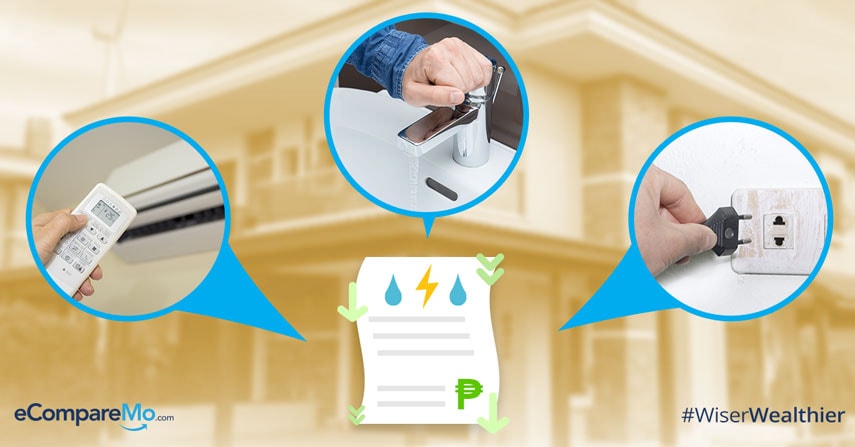16 Tips To Keep Utility Bills Low And Still Beat The Heat This Summer
4 min readAs summer heats up, we are going to be spending more on both water and electricity to stay cool.
Eco-tuning our usage of these two resources will not only contribute to saving our planet but will save your budget from hefty expenditures on utilities.

Here are sixteen nifty ways you can cut down your energy and water consumption and keep your utility bills low this summer.
1. Unplug appliances and devices.
Even when turned off, an electronic device that is left plugged in consumes power. The energy that unused appliances drain is called “phantom loadâ€.
Tip: Any device that has an active clock or light, is still consuming power. As long as a charger is plugged-in, even if a device is fully charged or if there is no device attached, it is still consuming power.
2. Keep the lights off.
Light bulbs release heat which can be trapped inside a room. During the day, maximize your use of natural light and keep the electric lights off as long as possible. At night, turn off all the lights when you go to sleep. In this way, you are saving energy while cooling the room at the same time.
3. Time your AC use.
You only need a little time to cool an area using an air conditioner. Use the aircon timer to ensure you don’t keep it running for too long.
Tip: Turning the fan on right after turning the aircon off will keep the cool air circulating around the room at a lower cost than keeping the aircon running all day.
4. Check the aircon’s filter.
An AC unit will perform better and be more energy-efficient when it is free from dirt. It is best to have a quarterly checkup and cleaning service lined up for your air conditioners.
(Read: 5 Moneysaving Tips That Are Also Good For The Environment)
5. Use blackout curtains and window films.
Natural light can cut your use of light bulbs, but direct sunlight can also quickly heat up a room. Installing blackout curtains prevents sunlight from coming in. Installing insulating window films allows you to let the light in while keeping the heat out.
6. Keep cooking to a minimum.
The heat produced from cooking not only heats up the kitchen but can move to other living spaces inside the home too.
If you have a shaded cooking area outside, like a patio, now is the time to have outdoor grills and barbeques. You can also try consuming more foods that can be consumed cold, like salads.
7. Paint your home exterior in light colors
Light colors reflect heat while darker shades absorb sunlight and retain heat for a longer period.
8.Check your overall home insulation.
Properly insulating your home will not only keep you and your family cooler, it will help keep money in your pocket.
Although the windows and doors are closed to shut away the sun, heat can still seep in and get trapped inside the house. Get a professional to inspect your home for insulation repairs.
9. Invest in Energy Star appliances.
Look for the Energy Star logo when buying appliances. Being Energy Star certified means that the item has passed a series of functionality tests to assess its overall energy efficiency.
10. Note these refrigerator general rules.
Make sure that your fridge is loaded with the right amount of food to lower the energy consumed for cooling. Too much food stored will force the fridge to use more energy to keep things cool.
Another tip is to move your refrigerator at least two inches from the wall to give more room for proper ventilation and prevent the unit from being overworked. Also, keep your fridge away from stoves, ovens, and direct sunlight.
11. Run the clothes on cold.
Using cold water when doing the laundry will significantly deflate your electricity bills as your machine won’t need to consume energy for the water heater.
Tip: Take advantage of the sun and air-dry your clothes instead of loading your wet clothes in the dryer.
12. Do not leave the faucet running.
Make sure the faucets are turned off when not in use.
Tip: Use a glass or a cup when brushing teeth. Use a basin when washing fresh produce.
13. Be conscious of how long you take to shower.
An eight-minute shower consumes an average of 17.2 gallons of water. During summer, most of us resort to multiple showers in a day which causes the water bill to spike up.
Tip: Use a bucket and a dipper instead to keep your water usage regulated.
(Read: 21 Creative Ways To Save Money)
14. Do not flush trash down the toilet.
Though it may seem convenient to just throw waste in the toilet and flush, doing so will require more amounts of water to be used. Throw tissues and rubbish in the bin where it belongs.
15. Maximize loads in the washer and dryer.
Frequent washing means more usage of water and electricity. Make a laundry schedule to lessen the number of washes. However, do not let the dirty clothes pile up too much as overloading will overwork your machine and end up consuming more energy.
Tip: Do not put too much cleaning agents in your load as you will need more water to rinse away them away.
16. Schedule annual plumbing inspections.
Yearly plumbing checkups will detect minor damages in the water system. Early detection and repair of broken pipes and minor leaks will save you from more expensive plumbing problems.
Sources: Primer, Coins.ph, Lamudi, Rappler, This Old House, Bankrate, Modernize
